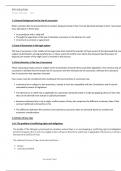Summary
The Law of Succession in South Africa, 4th Edition by Jamneck Complete Summary
- Course
- Institution
- Book
Hi, this document is a complete summary of The Law of Succession in South Africa, 4th Edition by Jamneck, Prescribed Text Book The Summary is for the upcoming exam
[Show more]



